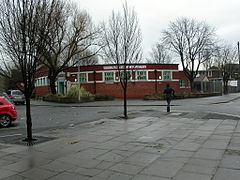Winton, Greater Manchester
| Winton | |
|---|---|
 Winton Community Library |
|
| Winton shown within Greater Manchester | |
| Population | 12,339 Ward profile conducted by Salford City Council in 2014. |
| OS grid reference | SJ757988 |
| Metropolitan borough | |
| Metropolitan county | |
| Region | |
| Country | England |
| Sovereign state | United Kingdom |
| Post town | MANCHESTER |
| Postcode district | M30 |
| Dialling code | 0161 |
| Police | Greater Manchester |
| Fire | Greater Manchester |
| Ambulance | North West |
| EU Parliament | North West England |
| UK Parliament | |
| Councillors |
|
Winton, originally "Withington" is an area north-west of Eccles in Salford, Greater Manchester, England. A profile of the ward conducted by Salford City Council in 2014 recorded a population of 12,339.
Historically in Lancashire, Winton is a residential area surrounded by Patricroft, Peel Green, Monton, Barton-upon-Irwell, Eccles and Worsley.
Winton electoral ward is represented in Westminster by Barbara Keeley MP for Worsley and Eccles South.
The ward is represented on Salford City Council by three councillors:
Margaret Morris (Lab)
Paula Boshell (Lab)
David Lancaster (Lab)
indicates seat up for re-election.
Winton is between Monton, Worsley, Peel Green and Patricroft, divided by the motorway interchange of the M602, M60 and M62. The boundaries of Winton are the Liverpool-Manchester railway on New Lane (borders with Peel Green), the railway on Worsley Road (borders with Patricroft), the Bridgewater Canal bridge at the top of Parrin Lane (borders with Monton) and the Worsley Road/Barton Road change (borders with Worsley).
The name is derived from the Anglo-Saxon of windy village (win = windy and ton = village or hamlet).
Winton, along with some of its neighbouring villages, including Barton and Monton, is believed to be Saxon in origin. However, Winton is not in the Domesday Book although neighbouring Barton is. Winton is believed to have been originally known as Withinton. In 1262, Richard de Winton was granted 7 acres (28,000 m2) of land by former landowner, Thomas Grelley, at a rate of one shilling and two pence (1s 2d or 6p) per year. These 7 acres (28,000 m2) grew over the next few decades to become the hamlet of Winton.
...
Wikipedia

